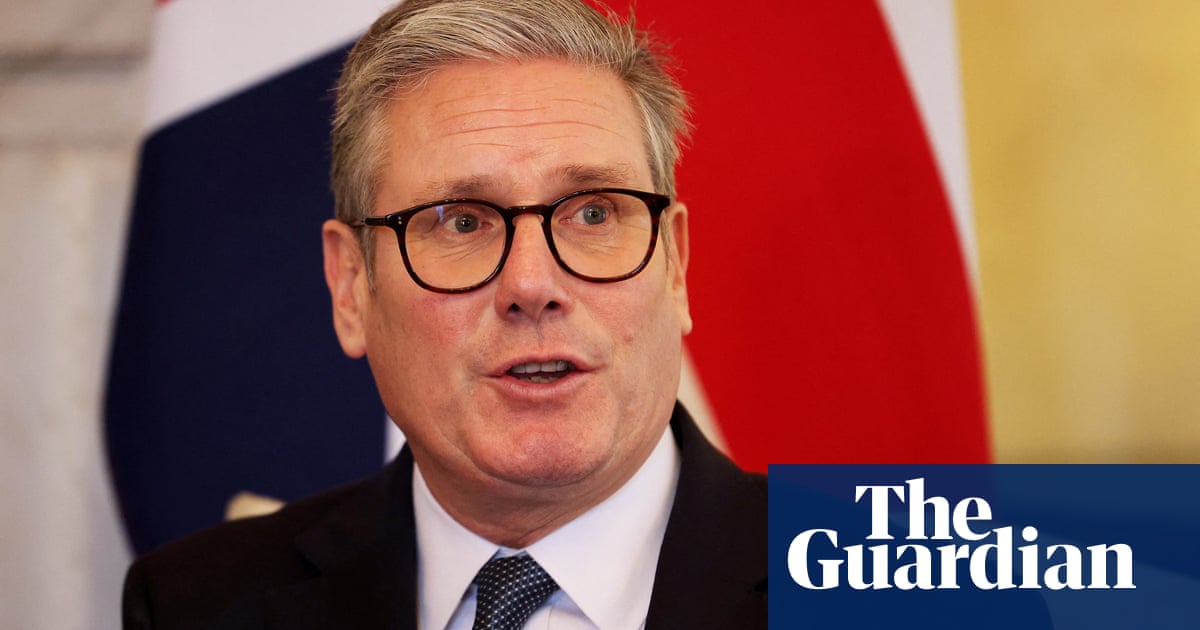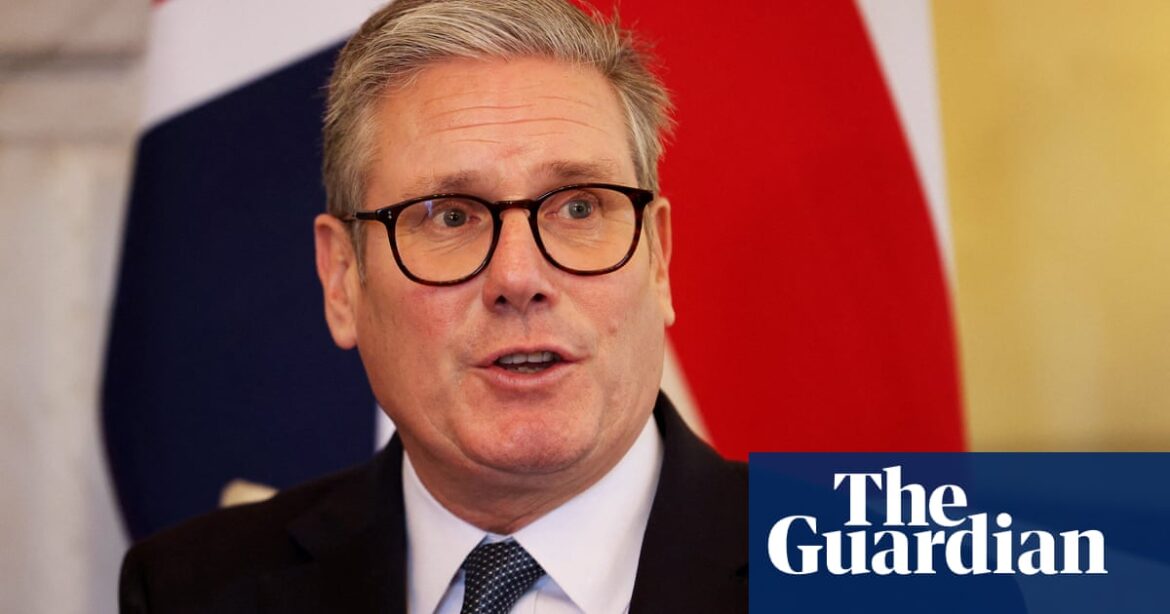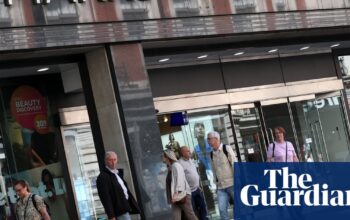
Keir Starmer will pledge billions of pounds of extra investment in transport, schools and hospitals in his inaugural budget, as he insisted he would not be distracted by “side winds” after a turbulent first 100 days in office.
In an interview with the Guardian, Starmer acknowledged his government needed to get back on track after the furore over Sue Gray and “freebies”, but said he was determined he would not be “knocked off course”.
“You’re going to get side winds all the time. If you’re not going to get knocked off course, you’ve got to know where we’re headed,” said Starmer.
“The moment I allow myself to get too bogged down in the side winds is the point that other governments have gone wrong, in my view, because they’ve lost sight of what the real point of government is.”
Starmer has made clear his central mission is to get the economy growing. The government is hoping that billions of pounds of public investment unveiled at the budget will help attract more private investment to the UK.
However, his plans for a flagship business summit next week were dealt a blow on Friday when the logistics giant DP World pulled out of the conference and withdrew a scheduled announcement of a £1bn investment in its London Gateway container port.
The move came in response to an interview in which Louise Haigh, the transport secretary, criticised the company’s employment practices, calling the firm a rogue operator. In 2022 P&O Ferries, a subsidiary of DP World, provoked fury when it fired 800 crew without warning, replacing them with low-paid agency staff.
In an apparent bid to get the summit back on track, the prime minister said on Friday night: “That’s not the view of the government.”
The Guardian understands that the budget will be presented as a down payment on “fixing the foundations” of the country, as the government uses all the levers at its disposal to grow the economy, with capital investment at the heart of its plans.
Starmer’s words are the clearest signal yet that the government is pushing ahead with plans to borrow tens of billions of pounds extra for infrastructure investment by changing how it calculates the fiscal rules.
Rachel Reeves, the chancellor, told the cabinet on Tuesday she wanted to change how the Treasury accounted for capital spending to reflect its benefits, despite concerns about the rising cost of UK government debt.
A senior government source said the capital investment would go into improving schools and hospitals, repairing crumbling buildings and investing to make the system work better, in things such as medical diagnostic equipment.
Other areas for capital spending were expected to include rail and roads, as well as money to invest alongside businesses such as gigafactories and renewable energy projects.
The government was looking to make a big argument for long-term investment, the source added, but the chancellor had been very clear that putting investment in would need to see a quick return in turns of services being improved and delivering on good jobs.
“It’s common sense to invest and build. If working people can’t afford a decent home, they can’t build good lives and careers,” Starmer told the Guardian.
“When people can’t get to work because public transport is poor, productivity suffers. If schools are crumbling over our children’s heads, how can we expect them to learn the skills they need?
“And NHS waiting lists are through the roof, because there has been nowhere near enough investment in hospitals and the technology that could make treatment more efficient and more effective.”
He added: “While other countries have powered ahead, building big and taking advantage of new technology, Britain has been left to make do with their out-of-date ideas and out-of-date services.”
However, some Labour MPs are worried about whether long-term promises of investment will go down well with voters facing immediate challenges from winter fuel and benefit limits. One backbencher said: “Nothing I’m hearing is giving us much to sell on the doorstep. It’s lucky there’s not an election for another four years.”
Starmer acknowledged the need for “a bit of the sunny uplands” to give people some hope for the future, after months of doom and gloom from the government around the state of the economic inheritance from the Tories.
“I needed to get to ‘what’s it for?’,” he said. “Being able to say to people that this is what it begins to look like, this is your better life at the end of it … We cannot deliver what we need to deliver until we fix the foundations.”
after newsletter promotion
Starmer admitted that his first months in office had been tough – with rows over donations, internal power struggles and tough decisions over issues such as the winter fuel payment – but that had not been a surprise.
“It’s been very much what I expected. It’s proved the thesis that government is tougher, but that government is better. Tougher because you’ve got to take tough decisions. Better, because you can take decisions and make a difference.”
Yet he appeared to brush aside some of the criticism the government has attracted, listing dozens of major decisions the government had already made since taking office, and saying there would always be those who wanted more.
“You will always get people giving a view. I do it myself in Arsenal games, as do 59,999 other people. It’s the same in politics. But only the manager knows what’s the game plan for this match,” he said.
“There will always be people who say go faster, go slower, go higher, go lower, that is the nature of the beast. But are we on track? Yes.”
However, he admitted that coming under sustained fire for accepting gifts – including glasses, clothes and tickets – worth thousands of pounds had been difficult, particularly when his family were dragged into it.
“I’m not going to pretend its pleasant, because of course it’s not pleasant, but it wasn’t a first-time experience, and I doubt it will be a last one either.”
He said he understood why he had been repeatedly pressed on donations and why the public, having been assured that a Labour government would be different from what went before, was so angry. “Yes, I can see that. I can see why you and others ask as many questions as you can.”
But he rejected the view, taken by some, that the row proved that all politicians were the same. “No, I don’t agree with that. Look at what went before, which was Covid contracts, which was not actually complying with the rules, which was lying to parliament. It is a million miles away from all of that.”
Just weeks after the election, the government announced it was going to cut winter fuel duty for all but the poorest pensioners, a decision that caused public uproar. “It’s one of the toughest decisions I’ve had to make. Tough decisions are tough decisions, they’re not popular decisions,” he said.
The government argued the move was necessary to help fill a £22bn black hole left by the Tories, and that pensioners would actually end up better off as a result of the pensions triple lock, but many Labour MPs feared it was a serious misstep that could prove disastrous this winter.
Despite being in the job for just over three months, Starmer has already been faced with public disappointment, with polls showing his personal approval ratings reaching record lows. He insisted he was aware the government has to deliver change in order to restore faith in politics.
“I have a heavy responsibility. My job is to deliver and I’m going to get judged on delivery. In the end I want people to be better off under a Labour government, I want to be able to look people in the eye and say we’ve changed the way our economy works, so you are better off.”
Source: theguardian.com



